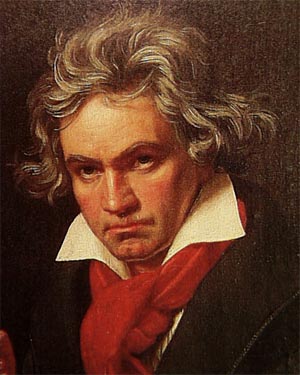 For kicks I decided to listen to nothing but classical music for a month. Having bounced around looking for the next genre to capture the power of old school metal, I realized that none were coming close, so skipped the drama and went right for the heavyweight — classical. In specific, I’d found the following frustrations:
For kicks I decided to listen to nothing but classical music for a month. Having bounced around looking for the next genre to capture the power of old school metal, I realized that none were coming close, so skipped the drama and went right for the heavyweight — classical. In specific, I’d found the following frustrations:
- Jazz fans tend to praise music for its external traits, like how wild the sounds are, not the composition. This is because jazz composition is either based on pop music from the 1930s, or totally random. Most of the soloing is 80% random or memorized licks used to kill time while the musician tries to think up something good. Jazz fans don’t want to hear this because they listen to jazz to seem profound to their friends, and like talking about how it’s superior to every other form of music, especially country, metal and classical (“those people can’t improvise,” they say of the people who invented and still practice structured improvisation).
- I like the idea of noise music and many of the people involved with it. The music itself is fucking boring. It’s a texture study with some dynamic manipulation for effect, which gives them only a few semi-linear song structures they can develop. The result is a focus on the trivial, so that anyone who mikes his colon and samples a tractor engine through it then finds a way to distort it using atmospheric noise and biofuels becomes the Latest Genius, even though the end result sounds about like everything else.
- Similarly, I like the idea of industrial music, but it has been swallowed up by dance music and the beat-addicted nature reminds me of all I don’t like about our modern time: spoon-fed, concentration-interrupting, doofus-friendly society. Even stuff like VNV Nation, which is pretty brainy, gets old after a listen or two for this reason.
- I like the idea of country, and can enjoy bluegrass and pre-hippie folk, but not all the time. Much of it sounds very similar to my ears which may have to do with its reliance on similar techniques.
- I would never listen to metal for metal’s sake. That’s how you make something weak, by being an unquestioning audience. For this reason, other than a handful of releases, I skip out on post-1996 metal. The exceptions are great however.
- The “youth culture” aspects of popular music — how it’s a high-ticket item sold on certain assumptions, how millions of people use it as a cause/life/goal substitute, how it’s generally not profound thus people contort to give it extra gravitas — are what doomed metal and doom these other genres. I want to avoid the kiddie marketing and in-group/out-group social club aspects that get in the way of the music.
- This “youthiness” to the music means that you are expected to be willing to spend absurd sums of money, waste hours of time poking around magazines and web sites and youth chatter boards, all while becoming a target for the “youth market” of large corporations who realize that you can pander to people while condescending to them. They treat anything “youth” like it’s for morons and still people eat it up. They’re not going to do anything but insult your intelligence and cryptically hide information so someone can be the smartest monkey in the group for having found it.
- Popular music is, under the hood, very similar in melody, harmony and rhythm. As a result, dressing it up becomes the most important task. If you take a standard pop song and add a screaming female vocalist, a tuba player and a disco beat, it’s now “edgy.” Take that same pop song, drop the drums and add a chorus of gay penguins, and it’s “innovative.” Or just indulge in camp and mixed-up styles from the past and you’re “ironic.” Does anyone actually fall for this? Well, they know nothing of music theory, have little experience of life, and… here’s the secret: they have low self-esteem, are ordinary, but are trying to socialize by having something in common with others that they can trade around in a transactional basis. So they have rock music and they don’t care as much about the music as the cool.
 Because of this, I chucked aside the notion of listening to popular music — at all. Even if it’s underground or indie, if it’s in the popular music format, that’s how it will be perceived and treated, which in turn affects how I’ll have to interact with it and get ahold of it. Specifically, I noted how the greatest artists were straining to escape the kiddie music ghetto, like Tangerine Dream, Kraftwerk, Fripp and Eno. Why keep pushing the dead agenda?
Because of this, I chucked aside the notion of listening to popular music — at all. Even if it’s underground or indie, if it’s in the popular music format, that’s how it will be perceived and treated, which in turn affects how I’ll have to interact with it and get ahold of it. Specifically, I noted how the greatest artists were straining to escape the kiddie music ghetto, like Tangerine Dream, Kraftwerk, Fripp and Eno. Why keep pushing the dead agenda?
Instead I hauled out an already moderate classical collection and went on a shopping spree at Amazon and Joel’s Classical Music, a local shop. My idea was to go the opposite direction for a month and see where it led me. I didn’t do any research because I wanted to emulate the experience of the normal, curious listener who has a job and family and so discovers things by serendipity while the music is playing in the background, over the screaming kids, chattering coworkers, and blaring TV.
What made the transition hardest was the difference in dynamics. Rock music is meant to be a constant pulse; classical music is like a ocean wave, sometimes loud and sometimes inaudible, usually somewhere in the middle. With rock music, you hear the first thirty seconds and set your sound level; with classical, you really have to find the loudest part of the piece because the bulk of it may be softer.
Even more, there’s a textural difference. Where rock is guitars and bass and drums and vocals, classical musicians have a choice of more than a dozen instruments. They use them unevenly because what’s a good effect for one emotion, or part of an emotional journey, doesn’t fit in another. You can be awash in violins one moment, and caught up in bass and brass the next.
 Finally, there’s a time difference. Rock music is three-minute songs, with a few exceptions. Classical music has some three-minute songs, but more commonly, longer pieces are composed of several movements. Themes are shared across these movements, like a conversation with question, answer, debate, modification and restatement. You can’t hum a melody knowing that in thirty seconds, after the chorus, it’ll be back.
Finally, there’s a time difference. Rock music is three-minute songs, with a few exceptions. Classical music has some three-minute songs, but more commonly, longer pieces are composed of several movements. Themes are shared across these movements, like a conversation with question, answer, debate, modification and restatement. You can’t hum a melody knowing that in thirty seconds, after the chorus, it’ll be back.
But I did it: I spent a month listening to nothing but classical, except the unavoidable retro swing-rockabilly at the ‘Bucks and the clinky ringtones of my fellow subway riders. Having fought it through, I have a few recommendations for those wanting to get into classical music.
- Stick with the standards. Learn to listen to the music by sticking with the most time-tested successes, namely Mozart, Beethoven, Schumann, Brahms, Schubert, and Wagner. You can branch into baroque later, and modern classical later, as these are reaches. Learn first how to listen to the music.
- Don’t find the most obscure, dark and stormy or avant-garde classical you can. Every cretinous idiot who wants to show you how profound he is will come out of the woodwork and recommend you listen to Buttzurski’s Ten Meditations For a Dying, Fly-Covered Child in Marshall McLuhan’s Singularity, but the modern stuff doesn’t meet the challenge of the older and is in fact kind of trivial. Equally idiots will try to get you to listen only to “dark” classical or classical for rock fans. This is always a path to stupidity. Learn to understand the big names and anything else will be easy.
- Pick conductor carefully but worry less about orchestra and year. Conductors are like film directors; they interpret the piece and can either ruin it or make it shine. However, the difference between great conductors is minimal, while the difference between a great conductor and a bad one is infinite. Pick some established names, like von Karajan or Harnoncourt.
- Don’t shy away from Naxos. Naxos has a simple business model: find inexpensive orchestras in out of the way places to record classical pieces in interpretations based on the greats. It’s part-clone, part-practicality. We can’t all afford the big name conductor box set, but we can afford a $8 Naxos CD that uses a similar approach and unknown, rising musicians.
- Support your local classical store. Among other things, the people that work there took that job because they love the music — they’re not getting paid much. They are probably susceptible to polite conversation, almost always open to questions, and if encouraged, will give you a viewpoint you can use to plot your own course through classical music. If you find someone who hates everything you love and loves everything you hate, the value is not lessened — apply the “Rule of 180” and go nuts.
- Don’t tell your friends until you are listening to classical music regularly. People are going to try to talk you out of it because they fear that you’re going to see The True Musical Truth of Truthy Truthness, and turn around and treat them like they’d treat you, by saying that their music is the random mutterings of droning peon brains. Even if that’s true — and in my view, it is for most rock and jazz — you don’t want to get into that fight. Don’t act like the jazz fans. Instead, do your thing and when someone asks, tell them the composer name but don’t mention it’s classical. “I’ve been listening to a lot of this Italian guy, Arcangelo Corelli.” If you’re a total deviant like me, you can describe the music as atmospheric narrative instrumental music, and no one is going to think it’s anything other than Autechre with a voice-over.
I found it rewarding to throw out the rules and plunge into the abyss, and leave behind all the safety blankets I had come to know. I still love metal, but I’ve found that classical music listening has sharpened my ear and made it easy for me to throw out the crap metal and keep the best, which means that the metal in my life is stronger in quality not quantity and so it is able to compete well with any other genre. In addition, I’ve found a new musical passion that doesn’t require me to ever hear the term “ironic” again.
17 CommentsTags: baroque music, Classical, classical music, Heavy Metal, modernist music

